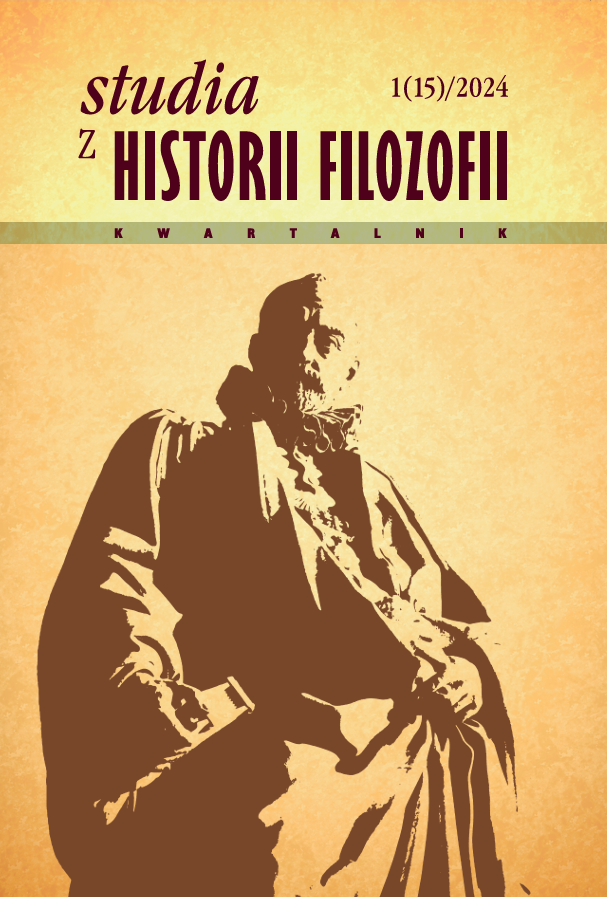Montaigne, Lukrecjusz i Nowy Świat
Esej O pojazdach - próba interpretacji
DOI:
https://doi.org/10.12775/szhf.2024.005Słowa kluczowe
Montaigne, Lucretius, New World, philosophy of history, skepticism, Epicurean ethicsAbstrakt
In this article, my aim is to interpret Michel de Montaigne’s essay On Coaches, firstly, as consistent, and secondly, as deeply marked by Lucretian ideas. I analyze three contexts in which the titular ‘coaches’ are present: luxury, war, and fear of death. Furthermore, I argue that they constitute mutually interacting ‘force fields’ that should be considered in relation to each other.Following this scheme, I reconstruct the relationship between this essay and De rerum natura on three levels: 1) a discussion involving the Lucretian idea of the finite and young world; 2) a specific repetition of Lucretius’ gesture: moral evaluation imposed on a basically neutral recognition of historical change and movement; 3) the connection of vehicles as symbols of luxury with the problem of the fear of death, or the lack of courage, as a source of moral degeneration.
Bibliografia
Adorno Theodor W. 1990. „Esej jako forma”. W: Theodor W. Adorno, Sztuka i sztuki. Wybór esejów, przeł. Krystyna Krzemień-Ojak, 89–90. Warszawa: PIW.
Bayod Jordi. „«Que la vie du monde est infinite»: Montaigne y la tesis de la eternidad del mundo”. Les Dossiers du Grihl. Les dossiers de Jean-Pierre Cavaillé, Libertinage, athéisme, irréligion. Essais et bibliographie, 2010. Dostęp 13.11.2023. https://journals.openedition.org/dossiersgrihl/3502.
Bayod Jordi. 2013. „Montaigne y la inmensidad del mundo: ‘Una perspetua multiplicación y vicisitud de formas’”. ENDOXA: Series Filosóficas 31: 321–348.
Bermudez Vázquez Manuel. 2015. The Skepticism of Michel de Montaigne. Heidelberg: Springer.
Boon Jean-Pierre. 1968. „Montaigne et Épicure: Aspects de l’Hédonisme Dans les Essais”. Comparative Literature 20(1): 64–68.
Brown Alison. 2010. The Return of Lucretius to Renaissance Florence. Cambridge London: Harvard University Press.
Casals Jaume. 2018. ¿Qué sé yo? La filosofía de Michel de Montaigne. Barcelona: Arpa.
Duval Edwin M. 1983. „Lessons of the New World: Design and Meaning in Montaigne’s Des Cannibales (I:31) and Des coches (III:6)”. Yale French Studies 64: 95–112.
Ford Phillip. 2007. „Lucretius in Early Modern France”. W: The Cambridge Companion to Lucretius, red. Stephen Gillespie, Phillip Hardie, 227–240. Cambridge: Cambridge University Press.
Frame Donald M. 1955. Montaigne’s Discovery of Man. The Humanization of a Humanist. New York: Columbia University Press.
Furley David J. 2007. „Lucretius the Epicurean: On the History of Man”. W: Oxford Readings in Classical Studies. Lucretius, red. Monica R. Gale, 158–180. Oxford: Oxford University Press.
Genz Henry E. 1962. „An Early Reference by Montaigne to ‘coaches’ and its Possible Bearing on the Meaning of Des coches”. Renaissance News 15(2): 133–134.
Griffin Robert. 1967. „Title, Structure and Theme of Montaigne’s Des Coches”. MLN 82(3): 285–290.
Hartle Ann. 2006. „Montaigne and Skepticism”. W: The Cambridge Companion to Montaigne, red. Ullrich Langer. Cambridge: Cambridge University Press.
Hendrick Phillipe. 1975. „Lucretius in the ‘Apologie de Raimond Sebond’”. Bibliothêque d’Humanisme et Renaissance 37(3): 457–466.
Hendrick Phillipe. 1979. „Montaigne, Lucretius and Scepticism: An Interpretation of the ‘Apologie de Raimond Sebond’”. Proceedings of the Royal Irish Academy: Archaeology, Culture, History, Literature 79: 139–152.
Jehlen Myra. 1991. „The Civilizations of the New World and the State of Nature”. Revue française d’études américaines 48/49: 117–124.
Keller Abraham C. 1957. „Historical and Geographical Perspective in the Essays of Montaigne”. Modern Philology 54(3): 145–157.
Landi Sandro. 2016. „Machiavelli e i Cannibali. A proposito di una questione aperta”. Bibliothèque d’Humanisme et Renaissance 78(1): 31–34.
Launay Robert. 2018. Savages, Romans, and Despots. Thinking about Others from Montaigne to Herder. Chicago‒London: University of Chicago Press.
Machiavelli Niccolò. 2009. Rozważania nad pierwszym dziesięcioksięgiem Historii Rzymu Liwiusza, przeł. Krzysztof Żaboklicki. Warszawa: WUW.
MacPhail Eric. 1998. „In the Wake of Solon. Memory and Modernity in the Essays of Montaigne”. MLN 113(4): 881–896.
MacPhail Eric. 2014. „Anthropology and Anthropocentrism in Giordano Bruno and Michel de Montaigne”. Bruniana & Campanelliana 20(2): 531–546.
Montaigne Michel de. 2004. Próby, przeł. Tadeusz Boy-Żeleński. Kraków: Zielona Sowa.
Moore Walter G. 1967. „Lucretius and Montaigne”. Yale French Studies 38: 109–114.
Pagden Anthony. 1982. The Fall of Natural Man. The American Indian and the Origins of Comparative Ethnology. Cambridge: Cambridge University Press.
Palmer Ada. 2012. „Reading Lucretius in the Renaissance”. Journal of the History of Ideas 73(3): 395–416.
Palmer Ada. 2014. Reading Lucretius in the Renaissance. Cambridge: Cambridge University Press.
Parslow Morris. 1959. „Montaigne’s Fat Man and the Meaning of Des Coches”. Renaissance News 12(1): 10–12.
Screech Michael A. 1998. Montaigne’s Annotated Copy of Lucretius. A Transcription and Study of the Manuscript, Notes and Pen-marks. Genève: Librairie Droz.
Smith Malcolm C. 1988. „A Source of Montaigne’s Uncertainty”. Bibliothèque d’Humanisme et Renaissance 50(1): 95–100.
Soehlke Heer Peter. 1993. El Nuevo Mundo en la visión de Montaigne o los albores del anticolonialismo. Caracas: Fundación Bicentenario de Simón Bolívar.
Starkstein Sergio. 2018. A Conceptual and Therapeutic Analysis of Fear. Switzerland: Palgrave Macmillan.
Starobinsky Jean. 1985. Montaigne in Motion, przeł. A. Goldhammer. Chicago: University of Chicago Press.
Titus Lucretius Carus. 1957. O naturze wszechrzeczy, przeł. Edward Szymański. Warszawa: PWN.
Titus Lucretius Carus. 2009. De rerum natura libri sex, przeł. Hugh A. Johnstone Munro. Cambridge: Kessinger Publishing.
Todorov Tvetan. 1996. Podbój Ameryki, przeł. Janusz Wojcieszak. Warszawa: Fundacja Aletheia.
Vance Jacob. 2012. „Force and Fraud in Michel de Montaigne’s Essays”. MLN 127(5): 267–293.
Vespucci Amerigo. 1995. Świat Nowy [do Lorenzo Pietro Francesco di Medici]. W: Amerigo Vespucci, Listy o odkryciu Ameryki, przeł. Jan Kieniewicz. Gdańsk: Novus Orbis.
Villey Pierre. 1908. Les sources et l’évolution des “Essais” de Montaigne. 2 vols. Paris: Hachette et Cie.
White Hayden. 1976. „The Noble Savage. Theme as Fetish”. W: First Images of America, red. Freddie Chiapelli, vol. 2, 121–135. Berkeley‒Los Angeles‒London.
Pobrania
Opublikowane
Jak cytować
Numer
Dział
Licencja

Utwór dostępny jest na licencji Creative Commons Uznanie autorstwa – Bez utworów zależnych 4.0 Międzynarodowe.
Statystyki
Liczba wyświetleń i pobrań: 454
Liczba cytowań: 0



